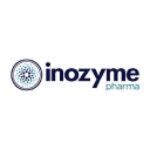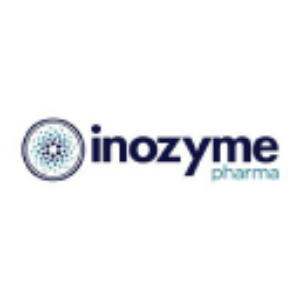Welcome to our dedicated page for Inozyme Pharma news (Ticker: INZY), a resource for investors and traders seeking the latest updates and insights on Inozyme Pharma stock.
Inozyme Pharma, Inc. (INZY) is a clinical-stage biopharmaceutical company pioneering enzyme replacement therapies for rare mineralization disorders. This page provides investors and healthcare stakeholders with essential updates on INZY's progress in addressing conditions like ENPP1 Deficiency and calciphylaxis through its lead candidate INZ-701.
Access consolidated news about clinical trial developments, regulatory milestones, and scientific advancements. Our repository includes press releases on study results, partnership announcements with research organizations, and analyses of INZY's therapeutic approach targeting the PPi-Adenosine pathway.
Key updates cover safety/efficacy data from ongoing trials, manufacturing collaborations, and presentations at medical conferences. Bookmark this page to efficiently track INZY's progress in developing treatments for diseases with significant unmet needs.
Inozyme Pharma (Nasdaq: INZY) announced that its CEO, Axel Bolte, will present at the 2021 Cantor Virtual Global Healthcare Conference on September 29 at 1:20 p.m. ET. The presentation will focus on the company's development of novel therapeutics for rare diseases related to abnormal mineralization, particularly those caused by mutations in the ENPP1 and ABCC6 genes. Investors can access the live webcast from Inozyme's website, with an archived replay available for 60 days after the event.
Inozyme Pharma received Orphan Drug Designation from the European Medicines Agency for INZ-701 aimed at treating ABCC6 Deficiency. The company’s Clinical Trial Application (CTA) in Europe and Investigational New Drug (IND) application in the U.S. for a Phase 1/2 trial have been accepted. The company expects to enroll patients by Q4 2021 and report preliminary data in H1 2022. As of June 30, 2021, Inozyme had $137.5 million in cash and investments, anticipated to support operations into Q4 2022. The net loss for Q2 2021 was $12.5 million, or $0.53 per share.
Inozyme Pharma (Nasdaq: INZY), a biopharmaceutical company focusing on rare diseases, has announced that Axel Bolte, the co-founder and CEO, will participate in a panel at the 2021 Wedbush PacGrow Healthcare Virtual Conference on August 11. The panel, titled UltraOrphan – When You’re One in a Million, is scheduled from 2:55 to 3:25 p.m. ET. Inozyme Pharma aims to develop innovative therapies for diseases related to abnormal mineralization, particularly focusing on genetic conditions linked to the ENPP1 and ABCC6 genes.
Inozyme Pharma (Nasdaq: INZY) announced the European Medicines Agency (EMA) granted Orphan Drug Designation to INZ-701 for treating ABCC6 Deficiency, a rare inherited disorder. This designation follows the earlier Orphan Drug Designation for this therapy for ENPP1 Deficiency. ABCC6 Deficiency can cause severe health issues, including vision loss and cardiovascular complications, with no approved treatments available. The Orphan Drug Designation may provide development incentives and a ten-year market exclusivity post-approval, fostering the potential for INZ-701 to be a first-ever therapy for this condition.
Inozyme Pharma (Nasdaq: INZY) announced the appointment of Gayle Gironda as senior vice president of human resources. With over 20 years of experience, her background in organizational design and talent management will support the company’s transition to a clinical-stage operation. Gironda previously held key HR roles at Bristol Myers Squibb and Alexion Pharmaceuticals. The leadership highlights a commitment to fostering a collaborative culture focused on treating rare diseases, as the company aims to develop innovative therapies for conditions related to abnormal mineralization.
Inozyme Pharma announced the acceptance of its Clinical Trial Application (CTA) for INZ-701 to begin a Phase 1/2 trial targeting ABCC6 Deficiency. This milestone is part of the ANSM's Fast Track procedure. ABCC6 Deficiency is a rare, inherited disorder leading to severe calcification, affecting over 67,000 people globally. INZ-701 aims to restore plasma pyrophosphate (PPi) levels, crucial for preventing harmful calcification. The trial is set to start in mid-2021, with preliminary safety data expected by year-end.
Inozyme Pharma reported Q1 2021 financial results, highlighting a net loss of $11.1 million, or $0.47 per share. The company maintains a solid cash position with $147.6 million, expected to support operations until Q4 2022. Inozyme filed a Clinical Trial Application for INZ-701 targeting ABCC6 Deficiency, aiming to start a Phase 1/2 trial in mid-2021. Recently published preclinical data in the Journal of Bone and Mineral Research showcases INZ-701’s potential for treating ENPP1 Deficiency. The company presented findings from a Burden of Illness Study, marking significant progression in its clinical development strategy.
Inozyme Pharma presented preclinical data at the European Calcified Tissue Society Congress, indicating that INZ-701, an enzyme replacement therapy, successfully increased plasma pyrophosphate (PPi) levels and reduced calcification in an animal model of ABCC6 Deficiency.
This is significant as ABCC6 Deficiency, associated with Pseudoxanthoma Elasticum (PXE), currently has no approved treatments. Results showed a 68% to 74% reduction in calcification, highlighting INZ-701’s potential to address this rare disease affecting over 67,000 individuals globally.
Inozyme Pharma, a biopharmaceutical company focused on rare diseases, announced that CEO Axel Bolte will participate in a fireside chat at the BofA Securities 2021 Virtual Healthcare Conference on May 13 at 11:45 a.m. ET. The event will be available via live webcast on Inozyme’s website, with a replay accessible for 90 days post-event. Inozyme develops innovative therapeutics targeting diseases caused by abnormal mineralization, specifically focusing on ENPP1 and ABCC6 Deficiencies. The company aims to address the underlying causes of these rare genetic conditions.
Inozyme Pharma announced promising preclinical results for its lead candidate, INZ-701, in treating ENPP1 Deficiency. Peer-reviewed findings in the Journal of Bone and Mineral Research revealed that INZ-701 increased plasma levels of pyrophosphate (PPi), improved several disease markers, and reduced mortality in ENPP1-deficient mice. Key results include a dose-dependent increase in PPi levels and prevention of ectopic calcification. Inozyme plans to initiate Phase 1/2 clinical trials for ENPP1 Deficiency in mid-2021, strengthening INZ-701's potential as a therapeutic option.


